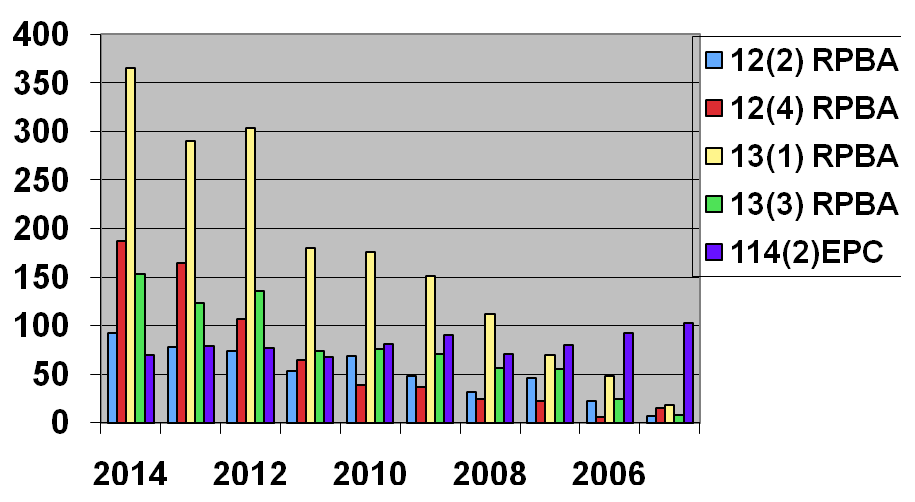There was a time where appeal before the EPO could be used to revisit anything that went wrong or was omitted in opposition proceedings.
Since 2003, when the Rules of Procedure of the Boards of Appeal (RPBA) were amended, the situation has changed. The Boards of Appeal, confronted with an increasing workload and with cases made more complex by further filings during the course of the proceedings, decided to streamline the proceedings and to have the possibility to limit the submissions to the first written exchange where possible.
The application of these new Rules of Procedure has become more and more apparent since 2005 (when the new Rules of Procedure started to have effect). Increasingly, the rules are being used by the Boards to limit the number of (auxiliary) requests and late filing of evidence, and by parties to object to late submissions of another party. More and more, the use of these rules replaces the earlier use of Article 114(2) EPC by the Boards (which gives all departments of the EPO discretion to disregard facts or evidence which are not submitted in due time). An analysis of the number of times the relevant rules of procedure have been cited in an appeal over the years is shown in the graph below. It also appears that the first-instance departments of the EPO now exercise their discretion on admission of late filings more strictly, which results in a knock-on effect in subsequent appeal proceedings.

In principle, the appeal proceedings are written proceedings, in which the parties’ complete case should be presented on the initial written submissions; less emphasis is placed on the oral proceedings, and even less on subsequent filings shortly before or even at the oral proceedings.
Under Article 12(4) RPBA, a Board can decide not to admit requests or evidence that are filed with the appeal, if these should have been filed in the first-instance opposition proceedings. For instance, this may apply in the case where the Board considers that a party should have reacted earlier to a preliminary opinion from the opposition division giving a negative view of that party’s case.
Article 12(2) RPBA makes it clear that the case as initially presented on appeal should be complete. This forms the party’s case which the Board will take into account (with the possible exception of submissions rejected under Article 12(4) RPBA). Any subsequent filings made by a party are covered by Article 13(1) RPBA, which gives the Board discretion to disregard a later change in the party’s case. The Board may exercise this discretion if such filings unnecessarily increase the complexity of the case, are not appropriate in the state of proceedings, or are detrimental to procedural economy. This may be the case, for example, if the Board, in its opinion, simply takes up the position of one of the parties: the fact that the Board expresses its opinion is not something new which allows a party to present further evidence or requests.
Article 13(3) RPBA emphasizes that it is not advisable to file further material or further requests shortly before, or even at the oral proceedings. If the Board considers that the remaining time is not sufficient for the Board or the other party to properly consider it, the submission will not be admitted.
These changes in the procedures before the Boards of Appeal are discussed in detail in the book: “Overview of the appeal proceedings according to the EPC”, written by members of the Boards of Appeal, Hugo Meinders, Ingo Beckedorf and Gérard Weiss. The content of the book is written in each of the three languages of the EPO, and is now in its second, updated edition. The book can be ordered from H. Tel Publisher at: https://www.htelpublisher.com/
In addition to the above topics, the other main issues of both ex parte and inter partes appeal proceedings are developed more in depth, with examples and appropriate jurisprudence.
It is a “must read” for those wishing to be further acquainted with the appeal proceedings before the Boards of Appeal of the EPO.
________________________
To make sure you do not miss out on regular updates from the Kluwer Patent Blog, please subscribe here.


